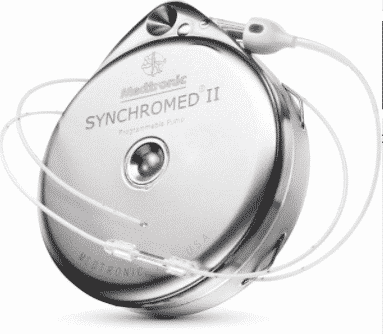
When you fill a prescription at the pharmacy counter you can often watch the pharmacist or technician carefully count pills or measure the exact amount of medications for a compound that your doctor has prescribed. As they dispense these medications, a pharmacist will ask if you’ve taken the medication before and if you are aware of the proper dosage.
While many medications have potential side effects, taking the medication as prescribed minimizes your chances of experiencing them and suffering harm. Patients who used the Synchromed II pain pump believed it was giving them the proper dosage of pain medications morphine and prialt, the muscle relaxant baclofen, and cancer drugs to treat their conditions safely. But the defective device caused some of them to receive over or under delivery of drugs that could lead to serious injury or even death.
In this blog post, I describe how the Synchromed II pain pump was supposed to work, the impact of its defects on patients, and note how its maker’s negligent actions are the subject of lawsuits.
What is The Synchromed II Pain Pump?
Manufactured by Medtronic, the Synchromed II is a programmable infusion pump implanted in the body for drug delivery to treat chronic pain, spasticity, and primary or metastatic cancer. A catheter is connected to pump on one end and the other is inserted into the intrathecal space in the spine. A port in the catheter allows for the injection of a drug directly into the implanted device for drug administration and diagnostic purposes.
Launched in 2004, the Synchromed II pain pump was designed to deliver medication, stored in a refillable 20ml-40ml reservoir, to specific parts of the body. With a drug delivery rate calculated and programmed into the device by a clinician, the reservoir is refilled three to four times per year. The device’s battery last for up to seven year, at which point the pump is replaced.
Out of Sight, Out of Mind?
With the pump surgically implanted into the abdomen pocket and programed remotely, patients suffering from serious and often painful conditions would likely presume that the device would do its work without much inconvenience to them. Once a clinician set it, they could mostly forget it until it was time for a refill or new device.
Unfortunately, the Synchromed II has had a history of problems. There have been recalls due to battery issues and refilling problems. The catheter can also migrate from where it was implanted, or separate or loosen from the pump. Moreover, several patients died when medication was injected into body tissue instead of the catheter, while blockages in the catheter and electrical shock also resulted in some deaths. The company has also warned its users about the reliability of medication delivery from the pump.
The U.S. Food and Drug Administration (FDA) has issued multiple warnings to Medtronic. Most recently, on April 27, 2015, U.S. Department of Justice and FDA filed consent decree of permanent injunction and civil complaint filed against Medtronic, alleging the company violated current good manufacturing practices by making “adulterated” products and failing to correct significant violations of FDA regulations uncovered during past inspections.
Health Consequences
If the Synchromed II pain pump fails, it can lead to an improper delivery of drugs that can lead to severe consequences for a patient’s health. These include:
- Over/underdose
- Withdrawal symptoms
- Organ failure
- Stroke
- Coma
- Return of spasticity
- Respiratory depression
- Death
Although the Medtronic has suspended manufacturing and distribution of the device, it is not recommending removal of the more than 200,000 devices currently implanted in patients. The company says it’s monitoring the situation and sharing new information about potential problems with doctors and patients as they receive it.
What Can You Do?
With defective implanted medical devices like the Synchromed II pain pump, what you can’t see can most definitely hurt you. If you or a loved one has this type of device, consult with you doctor to ensure your health is being closely monitored and that you are aware of symptoms that would require immediate medical attention. Also consider consulting with a product liability lawyer about what kind of compensation and damages you may be eligible to claim from Medtronic due to their part in knowingly keeping a problematic and defective device on the market for so long.
If you have questions about this or other faulty and defective medical products you’ve been exposed to, please contact Paul Miller at 416-646-3901 or by email at pmiller@hshlawyers.com to learn more about legal means to obtain compensation for your pain and suffering.






